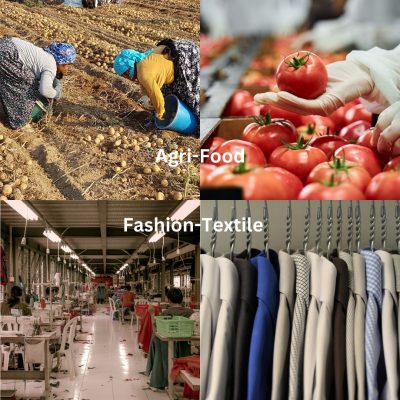Many players in the agri-food business in Germany have proven to be pioneers when it comes to sustainability. Medium-sized family businesses have introduced sustainability management systems to reduce their environmental impact, improve resource efficiency and fulfil their social responsibilities. The challenges are still great, especially as major food retail customers are passing on more and more demands in this area to their suppliers.
In contrast, the fashion and textile industry faces unique challenges on the road to more sustainable practices. This industry is characterised by global supply chains that often extend to the Far East and other countries outside the EU. Despite increasing consumer awareness of sustainable fashion, many companies face the challenge of sourcing sustainable materials, minimising the environmental impact of production and ensuring fair working conditions throughout the supply chain. Pressure from consumers, governments and NGOs to implement more sustainable practices is increasing, but the transition is often difficult and long-distance road.
Let’s compare how systematically the two sectors tackle the most important sustainability challenges:
Systematic sustainability management
Most companies in the food industry have been systematically working towards more sustainable business practices for several years now. A corresponding organisation and management system has been established. For example, almost 100 companies are certified according to the ZNU standard or operate their holistic management system according to the principles of the ZNU (Centre for Sustainable Corporate Management at Witten/Herdecke University). The core of the approach is the materiality analysis, through which the sustainability strategy is developed focused on the initially most important fields of action from the perspective of the stakeholders and the company.
There are few companies in the fashion and textile industry that operate their sustainability management systematically. Materiality and stakeholder analyses are rare. Many fashion players work on dozens of areas of activity at the same time and tend to get bogged down. A few try to protect themselves by only producing within the EU or even only in Germany. However, there are also quite famous fashion companies that, at least in public, do not seem to be concerned at all with the issue of more sustainable textiles.
There is a holistic certification approach with the Green Button: a certificate initiated by the German government for environmentally conscious clothing production with greater social responsibility, which is audited externally. It focuses less on the development of a management system (the “how”) and more on the implementation (the “what”). Another standard with a holistic approach is OEKO-TEX® Made in Green, which is also more concerned with the “what” and has added social responsibility on top of the environmental impact of production. Many companies have these certificates; some only oblige their partners on the production side. One fashion company is now ZNU-certified and is therefore fully committed to the “how”.
Despite the differences between the agricultural and food industry and the fashion and textile business, there are opportunities for both sectors to learn from each other and utilise synergies:
- The agri-food business can learn from the fashion industry how to make complex supply chains more transparent and practise sustainable material procurement. Digital technologies can also be used in the food industry to improve the traceability of products and ingredients.
- Conversely, textile companies can benefit from the advances made by the agri-food sector in terms of more organic farming and regional supply chains. The integration of sustainability management systems and the promotion of transparent production processes can help to minimise the environmental impact of the fashion industry and improve ethical standards.
Overall, the introduction of more sustainable business practices is a complex but necessary process for both industries. Through my experience of best practices from the agri-food business and the fashion and textile industry, we can jointly develop your sustainability management with a view beyond the industry’s boundaries. Let’s talk…
